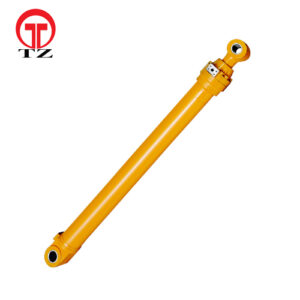Determining the appropriate specifications for a hydraulic cylinder for your excavator can be a complex process that depends on several factors.
Here are some key considerations to keep in mind when selecting a hydraulic cylinder for your excavator:
Size and Capacity: The size and capacity of the hydraulic cylinder will depend on the size and weight of your excavator, as well as the type of work it will be performing. The cylinder must be strong enough to handle the weight and force of the excavator’s components, while also providing the necessary force to move them.
Operating Pressure: The operating pressure of the hydraulic cylinder will depend on the operating pressure of the hydraulic system in your excavator. The cylinder must be able to withstand the pressure without leaking or failing.
Stroke Length: The stroke length of the hydraulic cylinder will depend on the range of motion required for your excavator’s components. The cylinder must be able to provide enough force throughout the entire stroke to move the components smoothly and efficiently.
Mounting Style: The mounting style of the hydraulic cylinder will depend on the specific design of your excavator. The cylinder must be compatible with the mounting points on your excavator and provide a secure and stable connection.
Seal Type: The seal type of the hydraulic cylinder will depend on the type of hydraulic fluid used in your excavator. The seals must be compatible with the fluid to prevent leaks and ensure optimal performance.
Customization: Depending on your specific needs, you may need to customize the hydraulic cylinder with additional features or specifications, such as a special coating for corrosion resistance or a different rod diameter for increased strength.
In summary, selecting the appropriate specifications for a hydraulic cylinder for your excavator requires careful consideration of several factors, including size and capacity, hydraulic cylinders for excavators operating pressure, stroke length, mounting style, seal type, and customization options. Consulting with a hydraulic cylinder manufacturer or an expert in excavator components can help ensure that you select the right cylinder for your needs.
How can I determine the appropriate customization options for my hydraulic cylinder?
Determining the appropriate customization options for your hydraulic cylinder will depend on your specific needs and requirements.
Here are some key considerations to keep in mind when selecting customization options for your hydraulic cylinder:
Corrosion Resistance: If your excavator will be operating in harsh environments or exposed to corrosive substances, a corrosion-resistant coating or treatment may be necessary to protect the hydraulic cylinder from damage.
Rod Diameter: The rod diameter of the hydraulic cylinder can affect its strength and durability. If your excavator will be handling heavy loads or performing demanding work, a larger rod diameter may be necessary to provide the necessary strength and prevent bending or other damage.
Piston Diameter: The piston diameter of the hydraulic cylinder can affect its force output and speed. A larger piston diameter can provide greater force output, but may also require more hydraulic fluid and slower speeds.
Mounting Style: The mounting style of the hydraulic cylinder can be customized to fit the specific design of your excavator and provide a secure and stable connection. Different mounting styles may be necessary depending on the location and orientation of the cylinder.
Stroke Length: The stroke length of the hydraulic cylinder can be customized to align with the range of motion required for your excavator’s components. This can help ensure smooth and efficient movement of the components.
End Fittings: The end fittings of the hydraulic cylinder can be customized to provide a secure and leak-free connection to the hydraulic system in your excavator.
Seals: The seals in the hydraulic cylinder can be customized to provide compatibility with the specific type of hydraulic fluid used in your excavator. This can help prevent leaks and ensure optimal performance.
In summary, selecting the appropriate customization options for your hydraulic cylinder will depend on your specific needs and requirements, including corrosion resistance, rod diameter, piston diameter, mounting style, stroke length, end fittings, and seals. Consulting with a hydraulic cylinder manufacturer or an expert in excavator components can help ensure that you select the right customization options for your needs.
